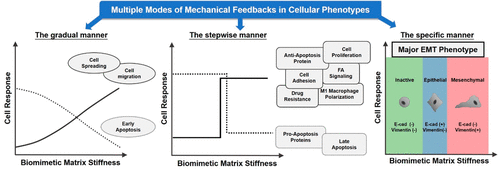当前位置:
X-MOL 学术
›
ACS Biomater. Sci. Eng.
›
论文详情
Our official English website, www.x-mol.net, welcomes your
feedback! (Note: you will need to create a separate account there.)
Biomimetic Matrix Stiffness Modulates Hepatocellular Carcinoma Malignant Phenotypes and Macrophage Polarization through Multiple Modes of Mechanical Feedbacks
ACS Biomaterials Science & Engineering ( IF 5.4 ) Pub Date : 2020-05-26 , DOI: 10.1021/acsbiomaterials.0c00669 Xi-Qiu Liu 1 , Xin-Ting Chen 1 , Zhen-Zhen Liu 1 , Sai-Sai Gu 1 , Li-Jie He 2 , Kai-Ping Wang 1 , Rui-Zhi Tang 3
ACS Biomaterials Science & Engineering ( IF 5.4 ) Pub Date : 2020-05-26 , DOI: 10.1021/acsbiomaterials.0c00669 Xi-Qiu Liu 1 , Xin-Ting Chen 1 , Zhen-Zhen Liu 1 , Sai-Sai Gu 1 , Li-Jie He 2 , Kai-Ping Wang 1 , Rui-Zhi Tang 3
Affiliation

|
The extracellular matrix (ECM) stiffening is an important sign of local microenvironment change, which is considered as a hallmark of many diseases including hepatocellular carcinoma (HCC). The fates of both cancer cells and immune cells can be regulated by mechanical feedbacks acquired from ECM, but there is a lack of a precise study of mechanical feedback modes in different cell phenotypes following with the progressively increasing ECM stiffness. Herein, we used a biopolymeric film without further modification of adhesive molecules, as a natural local niche to mimic a gradually stiffening manner from HCC onset in liver cirrhosis to its metastasis in the spinal cord. Three distinct manners of mechanical feedbacks were found: the gradual manner in HCC cell spreading, migration and early apoptosis to oxaliplatin, the stepwise manner in HCC cell adhesion, proliferation, focal adhesion (FA) formation, drug resistance, and macrophage M1 polarization; the specific manner in the stages of the progression of epithelial–mesenchymal transition at different stiffness ranges. Further investigation of molecular mechanisms confirmed those mechanical feedback manners by signaling activation of FA kinase, phosphatidylinositol 3-kinase, and expression of pro-/antiapoptotic and pro-/anti-inflammatory genes. Our results pave a novel avenue to know about mechanical feedbacks from ECM, which could be used for future cancer studies and in vitro drug screening applications.
中文翻译:

仿生基质刚度通过多种机械反馈模式调节肝细胞癌恶性表型和巨噬细胞极化
细胞外基质(ECM)的硬化是局部微环境变化的重要标志,被认为是包括肝细胞癌(HCC)在内的许多疾病的标志。癌细胞和免疫细胞的命运都可以通过从ECM获得的机械反馈来调节,但是随着ECM硬度的逐渐提高,缺乏对不同细胞表型中机械反馈模式的精确研究。在本文中,我们使用生物聚合物薄膜作为天然的局部生态位,以模拟从肝硬化肝癌开始到肝转移的逐渐硬化方式,以此作为天然的局部生态位。发现了三种不同的机械反馈方式:HCC细胞向奥沙利铂扩散,迁移和早期凋亡的逐步方式,HCC细胞粘附,增殖,粘着斑(FA)形成,耐药性和巨噬细胞M1极化的逐步方式;在不同的硬度范围内,上皮-间质转化过程中的特定方式。进一步的分子机制研究通过信号FA激酶,磷脂酰肌醇3-激酶的激活以及促/抗凋亡和促/抗炎基因的表达,证实了那些机械反馈方式。我们的结果为了解ECM的机械反馈提供了一条新途径,可用于将来的癌症研究和 分子机制的进一步研究证实了通过信号传导FA激酶,磷脂酰肌醇3-激酶的激活以及促/抗凋亡和促/抗炎基因的表达,证实了这些机械反馈方式。我们的结果为了解ECM的机械反馈提供了一条新途径,可用于将来的癌症研究和 分子机制的进一步研究证实了通过信号传导FA激酶,磷脂酰肌醇3-激酶的激活以及促/抗凋亡和促/抗炎基因的表达,证实了这些机械反馈方式。我们的结果为了解ECM的机械反馈铺平了一条新途径,可用于将来的癌症研究和体外药物筛选应用。
更新日期:2020-07-13
中文翻译:

仿生基质刚度通过多种机械反馈模式调节肝细胞癌恶性表型和巨噬细胞极化
细胞外基质(ECM)的硬化是局部微环境变化的重要标志,被认为是包括肝细胞癌(HCC)在内的许多疾病的标志。癌细胞和免疫细胞的命运都可以通过从ECM获得的机械反馈来调节,但是随着ECM硬度的逐渐提高,缺乏对不同细胞表型中机械反馈模式的精确研究。在本文中,我们使用生物聚合物薄膜作为天然的局部生态位,以模拟从肝硬化肝癌开始到肝转移的逐渐硬化方式,以此作为天然的局部生态位。发现了三种不同的机械反馈方式:HCC细胞向奥沙利铂扩散,迁移和早期凋亡的逐步方式,HCC细胞粘附,增殖,粘着斑(FA)形成,耐药性和巨噬细胞M1极化的逐步方式;在不同的硬度范围内,上皮-间质转化过程中的特定方式。进一步的分子机制研究通过信号FA激酶,磷脂酰肌醇3-激酶的激活以及促/抗凋亡和促/抗炎基因的表达,证实了那些机械反馈方式。我们的结果为了解ECM的机械反馈提供了一条新途径,可用于将来的癌症研究和 分子机制的进一步研究证实了通过信号传导FA激酶,磷脂酰肌醇3-激酶的激活以及促/抗凋亡和促/抗炎基因的表达,证实了这些机械反馈方式。我们的结果为了解ECM的机械反馈提供了一条新途径,可用于将来的癌症研究和 分子机制的进一步研究证实了通过信号传导FA激酶,磷脂酰肌醇3-激酶的激活以及促/抗凋亡和促/抗炎基因的表达,证实了这些机械反馈方式。我们的结果为了解ECM的机械反馈铺平了一条新途径,可用于将来的癌症研究和体外药物筛选应用。











































 京公网安备 11010802027423号
京公网安备 11010802027423号